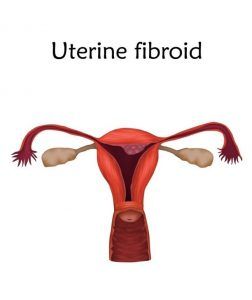
Warning Signs of Uterine Fibroids
January 11, 2022
Uterine fibroids (also called leiomyomas) are noncancerous growths in the uterus that often appear during childbearing years. The uterus is a pear-shaped organ which is usually the size of a lemon. However, fibroids can increase the size of the uterus, causing many symptoms that can affect the quality of life. It is estimated that 70-80% of women will develop fibroids in their lifetime, so it’s important to know what to look out for.
Fibroids are classified based on their location and its size. When fibroids grow in size, they create multiple issues in the body that can be identified through various symptoms listed below:

- Irregular period cycle: Fibroids can cause irregular period cycles or heavy period bleeding. Fibroids grow in the uterus creating pressure which results in heavy bleeding. Uterine fibroids can also disturb the flow of blood causing irregular periods. Heavy bleeding can cause a lack of red blood cells or severe anemia.
- Infertility: Women with larger uterine fibroids may also face infertility. When uterine fibroids are formed during pregnancy, it can lead to miscarriage or cesarean delivery. If fibroids are discovered during pregnancy, they should be monitored carefully by your doctor.
- Persistent urination: Uterine fibroids can also cause persistent, increased need for urination, if the location and size puts pressure on the bladder.
- Constipation: The presence of an enlarged fibroid can cause compression and lead to problems with bowel movements, causing constipation.
- Back and leg pain: If the fibroid grows at the back of the uterus puts pressure on the spinal column, the pressure can cause back pain. If the fibroid rests on the sciatic nerve, it can cause leg pain.
- Painful intercourse: Painful intercourse is a very commonly reported symptom of fibroids in women. Uterine fibroids can change the shape of the uterus, making contraction of the uterus during intercourse painful. This creates problems, pain, or discomfort during intercourse and can sometimes result in bleeding.
- Weight gain: Abnormal weight gain can be an alarming sign of fibroid growth. A large fibroid can weigh up to 20-40 pounds. Because fibroids can grow rapidly, unexpected weight gain is something to keep an eye on.
Though uterine fibroids are usually noncancerous, if they grow larger they can affect the other organs of the body. Some smaller fibroids can shrink on their own while others can cause life-altering symptoms that require active treatment. If you have experienced any of these symptoms, you should contact us immediately to schedule an appointment.
References:
- https://www.mayoclinic.org/diseases-conditions/uterine-fibroids/symptoms-causes/syc-20354288
- https://my.clevelandclinic.org/health/diseases/9130-uterine-fibroids
- https://houstonfibroids.com/posts/fibroid-symptoms/5-fibroid-warning-signs-to-watch-for/cc
- https://www.uclahealth.org/fibroids/what-are-fibroids
- https://www.google.com/search?q=constiaption+in+fibroid&rlz=1



